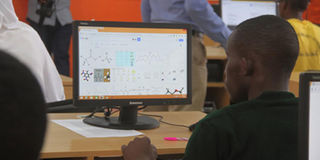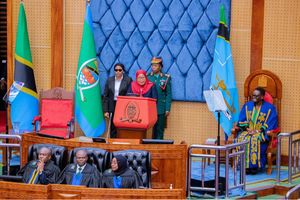Fun learning via free internet in Bagamoyo

A student at Lugoba Secondary School surfing for school materials in the new computer lab which is connected with internet. PHOTO I ESTHER KIBAKAYA
What you need to know:
Like many students in the country, Rachel hopes to do well in her Form Six final exams next year and get an opportunity to join one of the universities in the country where she will be able to fulfill her dream of being an architect.
Rachel Andrew is a Form Five student pursuing physics, chemistry and Mathematics at Lugoba Secondary School in Chalinze, Bagamoyo.
Like many students in the country, Rachel hopes to do well in her Form Six final exams next year and get an opportunity to join one of the universities in the country where she will be able to fulfill her dream of being an architect.
Since joining the school located on the outskirts of Bagamoyo Town, Rachel had to endure limited access to educational information due to scarcity of resources such as text books for revision.
Rachel’s case represents thousands of other students from different parts of the country who battle with the severe shortage of educational resources .
However, her case and that of her fellow students changed three months ago when Vietnam’s mobile network operator, which currently operates in Tanzania under the brand name Halotel, connected the school to the internet for free.
From October last year, the students at Lugoba Secondary School have been enjoying free access to the internet, allowing them to benefit from unlimited amount of education information available online.
When talking about their school computer lab, Rachel couldn’t hide her excitement. With free internet connection, Rachel says now she has access to important school materials such as online textbooks, which helps them learn in detail the lessons taught in class.
“Learning has become more easy and fun; before it was somehow difficult for some to afford all the text books needed since they are expensive. We had to rely on the few books we have.
But with access to the internet now it’s easier for us to search more answers and information on various
topics,” she says. Being her first time to use the computer, Rachel says she learned everything from their new school lab, “ I had no idea how to use the internet let alone how to look for school materials online, but this lab has given me and the rest of the students here that opportunity,” she explains.
“Apart from having access to various online school materials, I can now use the internet to look for universities abroad which teach course of my interest and even learn what architects across the world are doing,” says Rachel.
Rachel’s enthusiasm is understandable. The project comes at a time when the country’s authorities have launched a number of initiatives designed to increase access and the use of information and communications technologies in schools.
Benard Kabamila, a Form Six student attending the same school shares a similar experience. Bernard who dreams of becoming a pilot says he has learned how to send e-mails and use search engages more effectively.
“In here I get the answers to taught questions and things which I found interesting on certain topics because I am guaranteed to get detailed information with pictures and videos for instance; how planes operate and so forth,” explains Bernard.
The computer lab which has 19 computers connected to the internet has opened doors for students like Rachel and Bernard to learn more about the courses they wish to pursue in their further studies and even to look for colleges abroad.
Lugoba Secondary School is among the first public schools to benefit from Halotel’s project of free internet connectivity to 450 public schools for the next three years.
Tanzania started using internet services back in 1995 and up until 2000, the country had only 115,000 people connected to the internet. Since then the number has kept growing significantly, reaching 9.3 million users in 2014 which is 20 per cent of the 45 million people in Tanzania.
According to the Tanzania Telecom Report for 2013 published by Tanzania Communications Regulatory Authority (TCRA), there are six million internet users out of the 45 million citizens, which represents an increase of 23.8 per cent.
With such statistics, Immanuel Mhizi, an ICT and Geography teacher at Lugoba, says his school has benefited from such a vast growth of internet use.
“Now the endless amount of information in the Internet can easily be accessed through these computers. This will motivate students to do better in school thus progress in their learning process,” says Immanuel.
According to him, since the project was established in October last year, there have been significant changes both on how teachers conduct their lessons and how students learn.
“Now teachers and students can benefit from the online information, which cuts down the unnecessary cost of students going out to the internet café to look for materials online,” he says.
“Students also access the internet in a very calm and friendly environment and to ensure that at least every student has a chance to use the internet, we give them each at least half an hour in a day to use this computer lab,” narrates Immanuel
‘The speed is very fast, this gives room for more students to have access to the lab because they can access a large number of school materials within a short period of time. We can also easily monitor what they access particularly during class hours. We don’t allow them to have access to social media.
We encourage them to pay more attention on useful things which are important to their daily learning environment, we block sites which are not of value to them.”
The head teacher, Immanuel Sakasa, applauded the changes that have been brought by the availability of the free internet access to his school. He says now it’s easier for students to get notes on the subjects they have been taught in class.
He adds that the internet can easily enhance effective delivery of education when it comes to training students on computer.
“Form Five and Six students are in a better position now because some of their text books are expensive, therefore it was hard to have enough books but now that the problem is solved because they can now get references online,” explains the headmaster, adding that all 64 teachers in his school have benefited from the project.
He says his school will officially start conducting computer classes this year and they will start with Form One despite the fact that there has been an increase in operational costs particularly in electricity, but they are determined to embrace the opportunity.




